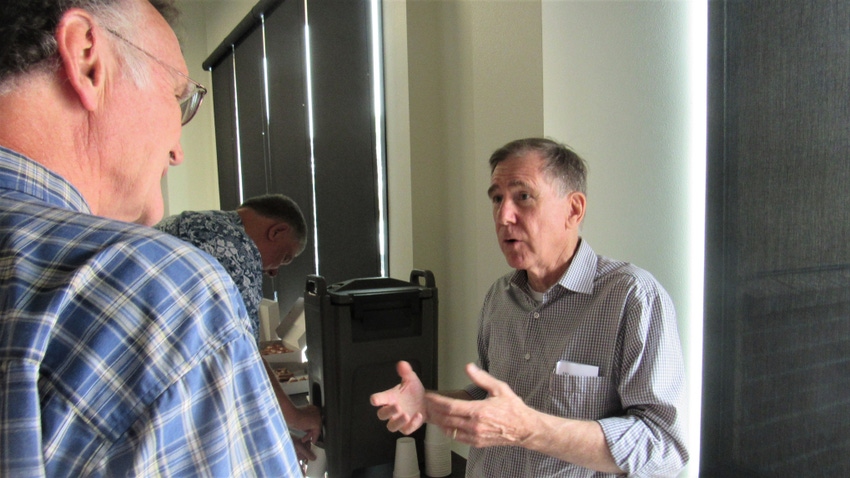
Voters showed there are limits to the bond funds they’ll approve to fix California’s perpetual water woes, defeating an initiative that would have provided another $8.9 billion for surface and groundwater storage.
They also enacted new confinement rules for egg-laying hens and calves raised for veal and rejected a repeal of gasoline and diesel taxes imposed by the Legislature.
Proposition 3, proposed by former state Natural Resources Agency deputy secretary Gerald Meral, would have provided more money for such efforts as repairs to the sinking Friant-Kern Canal in Tulare and Kern counties, safe drinking water, other drought solutions, and Sustainable Groundwater Management Act implementation.
However, the measure trailed, 52.4 percent to 47.6 percent, with 97.2 percent of precincts reporting, according to Secretary of State Alex Padilla’s office.
The measure followed a successful $7.5 billion water bond in 2014 and a $4.6 billion parks bond that passed in June, which included $1.6 billion for water-related projects. The latest effort was supported by more than 30 farm groups, including the Almond Alliance, California Citrus Mutual and California Farm Bureau Federation.
“Proposition 3’s passage would have provided critical funding to invest in aging infrastructure and diversify our water supplies to respond to a growing population, climate change and its impacts on long-term water supply reliability,” says Timothy Quinn, executive director of the statewide Association of California Water Agencies.
“While the result of last night’s vote on Proposition 3 is disappointing, I’m optimistic that California water suppliers can overcome these challenges through their proven history of innovation and dedication to a sustainable California water future,” he says.
Opponents, which ranged from the Sierra Club and Friends of the River to low-tax advocates, argued that voters had already approved eight statewide bond measures worth more than $29 billion on water issues since 1996, with limited improvements in water availability.
Proposition 12
Meanwhile, a decade after approving a Humane Society of the United States-sponsored initiative requiring egg-laying hens and certain other farm animals to have enough room to turn freely and fully extend their limbs, voters agreed to set specific space requirements for the animals.
Sixty-one percent of voters backed Proposition 12, which requires at least 43 square feet of floor space per veal calf and at least 1 square foot per egg-laying hen by 2020. By 2022, breeding pigs and their immediate offspring must have at least 24 square feet of usable floor space.
Agricultural groups including the CFBF and National Pork Producers Council opposed the measure, arguing that it would lead to predatory lawsuits against egg farmers and could disrupt supplies.
Daniel Sumner, director of the University of California’s Agricultural Issues Center, believes Proposition 12 will remove choices and raise prices for consumers of pork, eggs and veal, but it will have little economic implication for California agriculture.
“We have little pork and for the egg industry it has a mostly neutral effect,” Sumner tells Western Farm Press in an email. “It indicates continued challenges for agriculture as voters impose rules about farm practices that they know almost nothing about. Voters are willing to limit even the choice that most of them make themselves so long as that allows them to restrict the choices of other buyers.”
Other initiatives
In other measures, Proposition 6, a Republican-backed effort to repeal recently enacted fuel taxes and require voter approval of future increases, was trailing by about 55 percent to 45 percent, according to Padilla’s office.
Proponents, including former San Diego city councilman Carl DeMaio, had billed the initiative as “another taxpayer revolt in California.” But a coalition of cities and counties, political leaders and labor groups spent over $35 million to defeat it.
In Arizona, voters soundly rejected Proposition 127, which would have required at least half of retail power sales to come from renewable sources by 2050.
Mixed results
The initiatives’ fate came amid an election that saw former San Francisco mayor and current Lt. Gov. Gavin Newsom elected as California's governor and produced mixed results at the national level, as Republicans gained seats in the U.S. Senate but Democrats flipped at least 26 House of Representatives seats to narrowly gain control.
Despite a rough night for the GOP in the lower chamber, San Joaquin Valley Reps. Jeff Denham, David Valadao, Devin Nunes and Kevin McCarthy retained their seats, as did Democrat Jim Costa. The Republicans’ valley seats had been targeted as potential Democratic pick-ups.
“Representing the Central Valley in Congress has truly been the honor of a lifetime,” Valadao says. “This race is bigger than an individual candidate or political party. This race is about the families and individuals who make the Central Valley such an amazing place.”
The results could complicate passage of the 2018 Farm Bill. Sumner says the current House may move a compromise bill during the lame-duck session, but Democrats may wish to wait until they have the majority to get the rules they want for the Supplemental Nutrition Assistance Program.
About the Author(s)
You May Also Like






